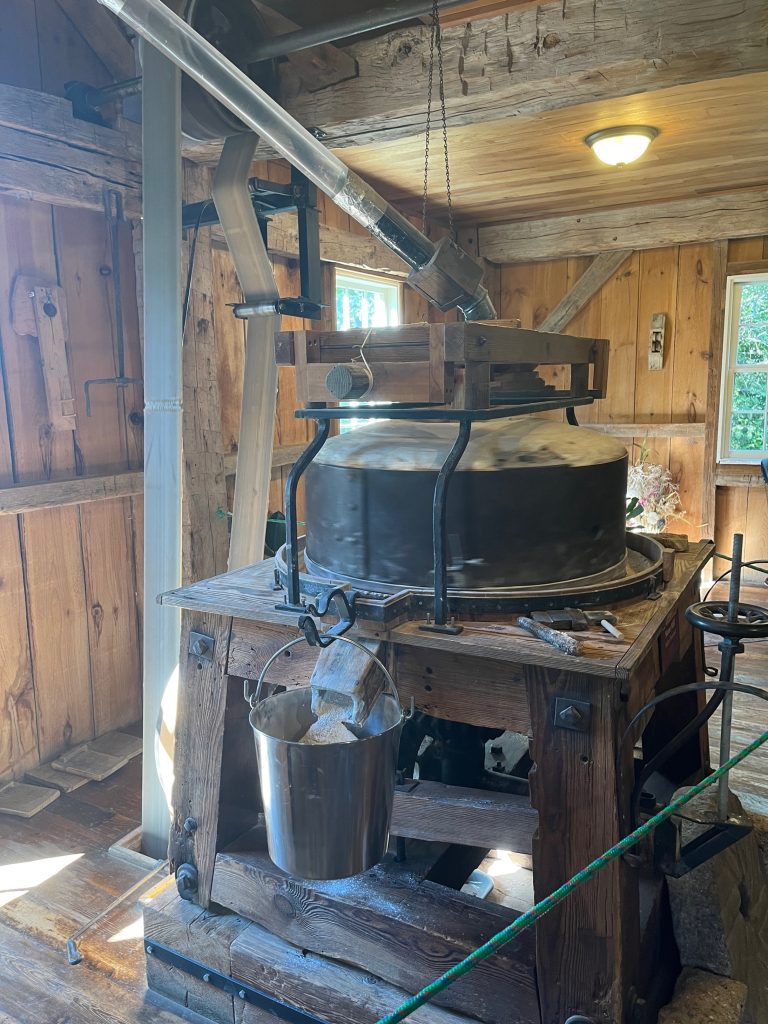
Agnes C Meeker
| This is a gem of a find located at Homestead Heritage site just outside the town of Waco, Texas. The restored gristmill from the 1760s operates daily, grinding cornmeal and flour. Homestead is an agrarian and craft-based intentional community. Its literature stresses simplicity, sustainability, sufficiency, cooperation, service and quality craftmanship. The daily activities go hand in hand with the seasons. The seasonal cycles of agrarian life provide a mooring and rhythm for the whole life of the community. |

| Other crafts both produced and taught at Homestead include quilting, a blacksmith’s shop, cheese making (with their own cave for aging), and basket weaving. Several stores, restaurants and coffee shops intermingle on the property. |
Before 1800 in America, over 25,000 small village gristmills dotted the countryside. Today about 200 remain, only a handful which are operational. The Homestead Gristmill is one of the two working mills in the State of Texas, and it’s the only one producing flours, meals and mixes for sale.


| Items for sale include three varieties of whole and sifted whole wheat flour from rye, spelt, kamut, buckwheat and rice, as well as whole wheat pancake mixes, muffin mixes and cookie mixes. Other products include cornmeal, corn grits, porridge, six grain cereal, trail mix, apple cider donuts and gluten free pancake and muffin mixes. All are milled from chemical free or organic grains with an increasing variety grown locally. |

The history of this mill is rather interesting – the following sign posted at the mill, tells the story.
“Built around 1760, the Teeter Mill came from the hilly area of north western New Jersey, which was settled by German Moravians and known as the Long Valley.

| “Beginning at a large white oak marked for a corner standing near a small swamp on the southwest side of the brook below the mill…” This excerpt from a 1708 land deed is the first known record of our Homestead Gristmill. Written when a German immigrant named Asher Mott deeded to sell his share of the family property to his older brothers, John and Gershom, for £1,000. Not long after the Mott brothers bought the gristmill, the American Revolution began and the American Army under George Washington camped at nearby Morristown. This was the bitter winter of 1780-81, when the soldiers were reduced to boiling their leather shoes for food, and the Mott brothers alleviated their suffering by providing them with flour. The property stayed in the family until 1800 when Robert Emiley purchased the mill and thirty acres for $213.30. In 1814 John Teeter acquired the mill and property. By then, the mill was the business and social center of a village that included a second mill and six residences and became known as Teetertown. The Teeter family operated and maintained their mill until 1881. In 1908, Philip Sliker purchased the mill, constructed a residence and began to process flour under the brand name of “Teetertown Brand Flour.” But in 1918, after ten years of operation, Mr. Sliker retired and closed the mill. After it last ground grain in 1918, the Teeter Mill went through a series of owners, most looking for a quiet getaway from the bustle of New York City. Left neglected for decades, by the turn of the twenty-first century it needed either demolition or restoration. In 2001 we moved the Teeter Mill to Texas where it once again grinds grain for the local community as it did over two hundred and forty years ago. Mr. Philip Sliker was the last miller to operate the mill before its move to Texas, circa 1908.” |

Beautifully restored, it absolutely warmed my heart to see this little water mill just grinding away as it was always meant to, and producing a quality product.
You can find out more about the mill on their website: https://www.homesteadgristmill.com/
paragraph

